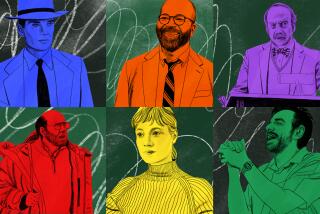Letters: Training teachers
Re “How to train a teacher,” Opinion, July 3
Eli Broad’s analysis of the data on teacher training avoids a key variable. If public education continues to be used as a battlefield for politics, teacher quality will continue to be an evanescent goal.
Over the years, teachers have realized they have little say in how they carry out “education” in classrooms. Rather, they await the latest panacea promulgated by their superiors. Teaching has become a reaction to the latest directives from above.
A better solution would be to revere and promote the teaching profession. Teacher training programs need to emphasize flexibility and creativity in the classroom. Collegiality and collaboration within the ranks of professional learning communities need to be promoted. Teachers need more classroom observation and less lecturing about the latest educational fads.
If you tell teachers they are doing it wrong and train them according to the latest panacea, they’ll go back to the classroom and implement the program. If you present them with a problem, tell them to use their professional skills to solve it and give them adequate resources, they’ll succeed.
Bob Bruesch
Rosemead
The writer, a 1997 inductee into the National Teachers Hall of Fame, is a member of the Garvey School District Board of Education.
Broad highlights an important disjunction in graduate education in the United States.
In schools of education, the underlying assumption is that if students are taught how to teach, then they can teach almost anything. In contrast, in discipline-specific graduate programs such as English and biology, the assumption is that if students are taught content knowledge, they can teach that subject. Unless they are in a school of education, most graduate students do not take even one course in how to teach.
Both extremes are equally wrong, and Broad’s recommendation for potential teachers to take courses in both subject content and teaching is right on the mark.
Dan Caldwell
Malibu
The writer is a distinguished professor of political science at Pepperdine University.
When I first saw Broad’s Op-Ed article on teacher training, I initially thought, “Here we go again with another outsider perspective.” But I think Broad made some salient points, particularly in his views on training being more content-based as opposed to focusing only on teaching strategies.
I’ve always felt that what is taught is as important as how it’s taught. When I first began teaching in 1978, the Ryan Act addressed this balance, ensuring that undergraduates didn’t enter the profession with only an education major.
In my 35-year career, I found the most effective educators were those teaching a subject within their major or those who had demonstrated more than a cursory knowledge of the material. I’m glad Broad realizes this and is working to encourage training programs to emphasize subject knowledge along with instructional strategies.
Lynn Robert Fairbanks
Diamond Bar
ALSO:
Letters: Mayor Garcetti’s priorities
Letters: Too much pain medication?
Letters: Conserve -- that’s an order!
More to Read
A cure for the common opinion
Get thought-provoking perspectives with our weekly newsletter.
You may occasionally receive promotional content from the Los Angeles Times.





